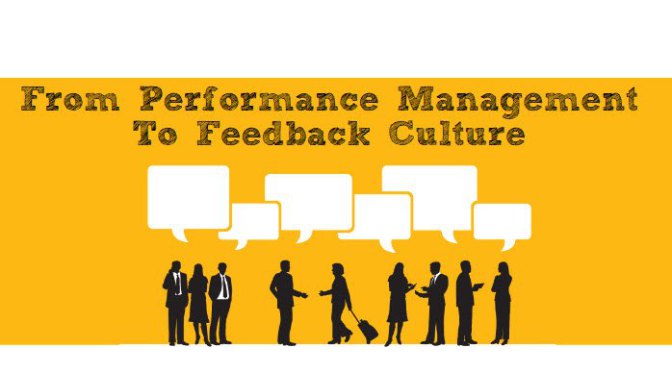
Post van Patrick Willer op Linkedin.com, juni 2016
From Performance Management to Feedback Culture
The purpose of a business is to create customers. Sharper performance results in more and happier customers.Thus… we aim to optimize performance, hence the business term: Performance Management.
Sounds simple, but of course it isn’t. Humans have a lust for control and have developed quite a few mental concepts to ‘control’ performance management; processes, ratings, manuals, competency frameworks, forms, collective labor agreements, etc. While all these things once had a purpose, the sum of it is not fit for duty 16 years into the 21st century.
It doesn’t take an academic study to know, to feel that these concepts are obsolete when we like to advance team collaboration. In today’s fast changing environment, collaboration is the key, because it’s the only path to innovation, which is the only path to happy customers.
What really matters is this: People connecting and leaving each other valuable feedback to improve the way you work. That will drive performance.
Let’s look at what we need to stop doing (the old) and what we need to start doing (the new).

While some things (need to) change, others remain pivotal. The following six topics are fundamental for any performance management process and culture. Including six questions to challenge yourself how your transition to modern performance management.
1. Workforce Alignment is fundamental
Aligning the employees to the right set of objectives remains the success factor. Showing employees the purpose of the company and what is expected of him/her is the most important factor in performance management.Without workforce alignment, any performance management process — annually or instantly — has no frame of reference and is entirely useless.If your mission and strategy is sound and your workforce is connected and engaged, then all they need is real time meaningful feedback, peer coaching and mentoring.
Pro-active alignment is more important than re-active measurement
Ask yourself: How is goal alignment incorporated in your new Performance Management process?
2. Feedback is magic
Feedback is essential for people to connect and learn from each other. The better people can exchange feedback, the stronger their network and its outcomes in terms of collaboration and cooperation. This feedback needs to be constructive and authentic to become meaningful and instrumental inanimating teams and corporate culture.
And it needs to be real-time! Why? Well if there is one thing our multitasking social media world is messing with, it’s our ability to remember. If I make mistakes helping out a client, then immediate feedback is needed. Not 11 months later in my performance review. You have to make hay when the sun shines! This has nothing to do with generations Y (Millennials) or Z (iGeneration). It’s the world turning faster.
Giving feedback is a skill. Educating the workforce to give each other authentic feedback is the single most important aspect of performance management
Ask yourself: How have you integrated real time, continuous, open feedback in Performance Management?
3. Space for mistakes is crucial
Everybody knows that people learn from mistakes. That’s how children grow up and how we evolve as a species. But how many performance management processes allow employees to make mistakes? They are often constructed to do the opposite. Employees covering up mistakes, because their sole focus of the performance management meeting is to get a salary increase. And managers are breaking their minds on how they should apply the mandatory forced rankings. Both are not helping to create an environment for healthy mistakes.
Ask yourself: How do you allow people to make errors and learn?
4. From judging to mentoring
Too many performance conversations are one way traffic where the manager is ‘judging’ the employee. Stop managing. Start leading. Don’t tell employees what to do. Involve them, explain things to them and demonstrate how it’s done. Not annually, but constantly and empathically. Coaching and mentoring programs are often separated from the performance management process. While rethinking the performance management process it’s worth to rethink a tighter integration between them. Coaching and mentoring are the real-time components that drive the effectiveness and productivity of teams. A crucial component of performance.
Ask yourself: How are protégé, coach and mentor relationships incorporated in your new performance process?
5. Time to rethink performance vs compensation
6. Time to rethink the purpose of ratings
7. Performance of contractors needs to be managed too.
Zie voor een toelichting op deze laatste drie punten het originele artikel.
Where to go from here?
A new performance management ‘system’ can only be applied in a new paradigm. I do not believe that you can have a hierarchical management structure/culture and then move to team based feedback. This would be a step back from traditional performance rating as most of us have today.
There is no way around it: to be successful you have to animate the culture, management style and attitude that propels performance management to the next level.
Bron: klik hier



